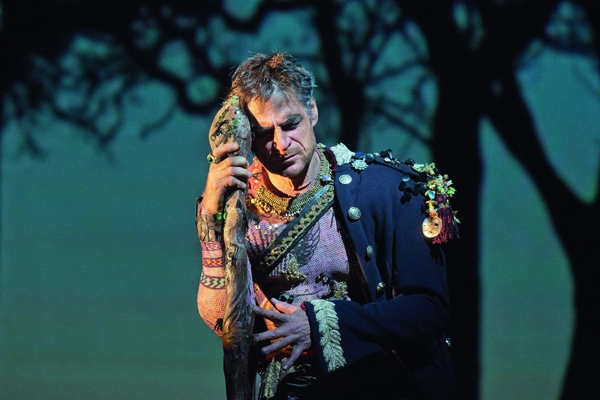2012 has been an undistinguished year in opera, at any rate in the UK. A combination of cutbacks and the promise of stops being pulled out next year for the bicentenaries of Verdi’s and Wagner’s births and the centenary of Britten’s has led to the big companies counting on our anticipation. Except that, in the case of Wagner, though oddly not of Verdi, the gun has been jumped. We have already had the Royal Opera’s Ring, four cycles of it in just over a month, so that there will be no staged Ring in London next year, only a concert version. It will be left to Longborough, for those who have the money, the time and the transport, to see it on stage, and judging from the individual parts that have been mounted in the past four years, the results should be tremendous.
There have been quite a few Wagner performances this year, some of them exceptionally fine. My most rewarding experiences were in Cardiff, Birmingham and Leeds, with Opera North’s Die Walküre in an all-but-staged performance easily taking the prize. The main reason for that, as with any overwhelming evening of Wagner, was the conducting: this year Richard Farnes has shown himself to be a master of such diametrically opposed idioms as Wagner and Janacek. That Walküre, which was relayed by the BBC, was the greatest performance of a Wagner opera I have heard since Reginald Goodall’s a quarter of a century ago. In the coming season, Opera North will be performing Siegfried, and one hopes that it will manage yet another miracle by discovering an adequate singer of the title role.
There has never been a surplus of great singers of the heroic 19th-century operas, but at present there is undeniably a crisis. The casting of the Royal Opera’s Les Troyens as much as of its Ring showed how severe the crisis is. The only unequivocally great heroic singing was from Bryn Terfel as Wotan, while the sopranos and tenors ranked somewhere between the tolerable and the impossible. It’s got to the stage where one is grateful if one goes to a performance of one of the great Romantic operas and the singers make it through without actually causing pain. That, and the unrelenting absurdity of almost all Wagner productions, means that concert or semi-staged performances are the only ones that one can safely look forward to. There are no signs yet of the apotheosis of the director having past its peak, if that’s what apotheoses do, so we can expect a year of irrelevant pretension there too.
Verdi’s birthday has been anticipated much less, but what I have seen, in the opera house and ‘live from the Met’, has been only moderately cheering. The individuality of the great Verdi singers of the past, as can be heard on many recordings starting more than a century ago and continuing until the 1970s, has been sacrificed to a uniformity, often in the name of fidelity to the score. This means that there is an international pool of singers who globetrot and turn up on stages together, with more or less indistinguishable results. Some of the idols of the moment, such as Marina Poplavskaya and Dmitri Hvorostovsky, can be relied on, usually, to produce beautiful tone and nothing more.
When you go — as any sensible opera lover nowadays regularly does — to a Met in HD relay, and see a Verdi production, you can be assured of a decent level of singing, but not of a lot more. Which brings me to the matter of plausibility in appearance and acting: when there are more or less continuous close-ups, as in the Met relays, vast tenors, ageing sopranos, acting by numbers become insufferable, and you think how much more pleasure you’d be getting from listening to them on the radio or CD. On the other hand, when the acting is of as high a standard as it was recently in the relay of Adès’s The Tempest, the impression is simply incomparable. But I suppose such achievements are rare and always have been.
On the other hand: do the rounds of the music schools, the Royal College and the Royal Academy, the Guildhall School, and you will almost always spend a delightful and rewarding evening, the rewards not being for an immense outlay, either. When people tell me that they can’t afford to go to opera, I tell them to avoid the main houses and find the relatively unadvertised performances. And not only the schools, but also English Touring Opera, or Dorset Opera, or Birmingham Opera Company, which deservedly gained fame this year for mounting the first complete performance of Stockhausen’s Mittwoch aus Licht, an astounding achievement, whatever one thinks of the work. Though there are far fewer operas put on now than there were a decade ago, there are still a remarkable number, and if the failure rate is high, I think that that is nothing new.






Comments